Resources
Respecting Rights Toronto – Coffee and Advocacy Monthly Meeting Notes
Respecting Rights Toronto is a project at ARCH funded by the City of Toronto, and led by persons labelled with an intellectual or developmental disability. Each month, self-advocates from Toronto meet in person or virtually to discuss issues that are important to them and to learn about their legal rights. Each meeting focuses on an area of law that ARCH practices in, with a strong focus on decision-making rights. Our meetings are accessible and use art-based methods to make learning fun and interactive, including role-playing, videos, music, and other creative activities.
If you are interested in joining one of our coffee and advocacy meetings, please contact Jessica Field at jessica.field@arch.clcj.ca
Missed a meeting or want to know what topic we have covered? Download our meeting notes below. The topics are also provided below.
2024 Meeting Notes
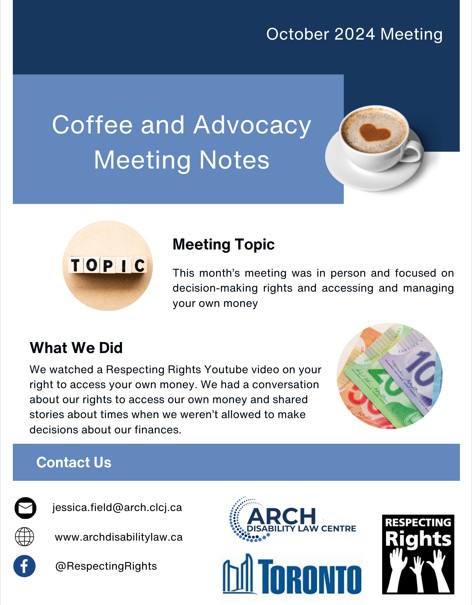
February 2024 Meeting
Topic: Brainstorming Session.
We brainstormed discussion topics. The group would like to talk about issues relating to: transportation, accessibility, decision making rights, direct funding, issues with agencies and staffing support
March 2024 Meeting
Topic: What is ARCH Disability Law Centre and Respecting Rights.
We had a presentation from Respecting Rights members and an ARCH law student on ARCH’s services. We did a role play about our right to make our own decisions and had a group discussion about why it is important to make our own decisions in our lives.
April 2024 Meeting
Topic: Your decision-making rights.
We did a role play on healthcare decision making rights and your right to be in a relationship. We played true or false games and had an open discussion about the importance of making your own decisions even if family or staff disagree with your choices.
May 2024 Meeting
Topic: Accessible Transportation.
Respecting Rights members did a presentation on the Accessible Canada’s Act (ACA) and the Accessibility for Ontarian with Disabilities Act (AODA). We talked about ARCH’s work in accessibility and transportation and we had a discussion about issues people faced with accessible transportation.
June 2024 Meeting
Topic: ARCH Services.
We had a presentation from ARCH law students on ARCH’s services and played decision-making rights games.
July 2024 Meeting
Topic: ARCH’s Services and an open discussion on a variety of topics led by self-advocates.
ARCH law students did a presentation about ARCH’s services and led a true or false game and role play on decision making rights.
August 2024 Meeting
Topic: Decision-making rights and being a self-advocate.
We talked about what self-advocacy meant to us, and what is important when making decisions. We did an art activity and played a decision-making rights game.
October 2024 Meeting
Topic: Decision-making rights and managing your own money.
We watched a Respecting Rights Youtube video on your right to access your own money. We shared stories about times when we weren’t allowed to make decisions about our finances.
November 2024 Meeting
Topic: The Ontario Rights Code and the Accessibility for Ontarians with Disabilities Act (AODA).
We had an ARCH lawyer teach us about the Ontario Human Rights Code and the AODA. We also talked about why accessibility is important in Toronto, and if we had the chance, what message we would want to send to the government about the importance of making sure Ontario is accessible.
Download 2024 Coffee and Advocacy Monthly Meeting Notes
2025 Meeting Notes
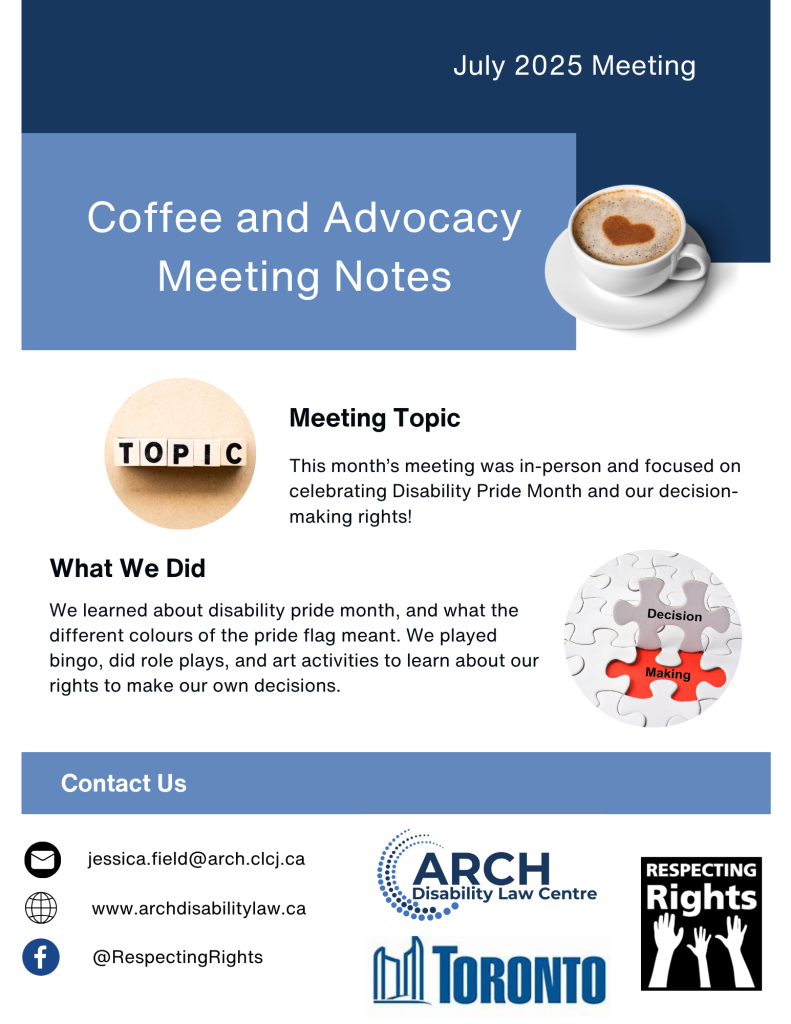
January 2025 Meeting
Topic: The 5 Standards of the AODA.
We had an ARCH lawyer teach us about the 5 Standards of the AODA: Information and Communication, Customer Service, Employment, Transportation and Design of Public Spaces. We also talked about why it is important for Ontario to be accessible.
February 2025 Meeting
Topic: The first standard of the AODA: Information and Communication.
We had an ARCH lawyer teach us about the first standard of the AODA. We played Role play games to practice asking for accessible information in a restaurant, and talked about why it is important to have information given to us in an accessible way.
May 2025 Meeting
Topic: Celebrating National AccessAbility Week!
This year’s theme was: Celebrating Inclusion and Breaking Barriers. We learned about these topics and discussed different ways to celebrate this awareness week.
July 2025 Meeting
Topic: Celebrating Disability Pride Month and our decision-making rights!
We learned about disability pride month, and what the different colours of the pride flag meant. We played bingo, did role plays, and art activities to learn about our rights to make our own decisions.
October 2025 Meeting
Topic: Accessible Spaces during the Holidays.
We discussed why physical accessibility in the city is important, how to check if a restaurant or building is accessible, and what the law says about accessible spaces
November 2025 Meeting
Topic: Creating our own mini magazine!
We discussed what it means to be an advocate, and what we learned about our decision-making rights. We also did an art activity where we created mini magazines to help show what we have learned this year.
Download 2025 Coffee and Advocacy Monthly Meeting Notes
5 Things Campaign
On April 8, 2021, Respecting Rights launched the 5 Things Campaign. This was a campaign to tell the Ministry of Children, Community and Social Services what self-advocates across Ontario wanted the government to know about what people with disabilities want to see change in developmental services.
A growing network of self-advocates who participated in Respecting Rights workshops identified 5 key priorities they want changed in Developmental Services. These include: people’s voices need to be heard, making complaints must be accessible, the same rights should be available for everyone, better staff training, and accessible technology.
This is not a comprehensive list, but these are 5 key changes that self-advocates have identified as fundamental to any larger reform that the Ministry is undertaking. Please see the one page poster identifying and describing the 5 key changes that people with disabilities are asking for.
When Respecting Rights heard about the proposed Developmental Services reform that the Ministry of Children, Community & Social Services says it is embarking on, self-advocates gathered across Ontario to discuss it in December 2020. Letters were sent to the Ministry December 31, 2020 by Respecting Rights and ARCH about the proposed changes to Developmental Services. Respecting Rights brought 9 self-advocacy groups together to send off a letter to the government April 8 2021 to remind the government that self-advocates are asking to be involved in change for Developmental Services.
Respecting Rights will continue to advocate to make sure people with disabilities have a voice at the table about the Developmental Services they receive.
HANDOUTS
Download Handout – Human Rights, Accessibility and Accommodations
Download Handout -Your Legal Right to Make Decisions about Your Money
Download Handout – Your Legal Right to Make Decisions about Your Health
Download Stop Light Cards
Download letter to The Hon. Todd Smith, Minister of Children, Community and Social Services
Download 5 Things Poster (RTF)
Download the 5 Things Poster (Word)
SUPPORT PEOPLE WITH INTELLECTUAL DISABILITIES TO GET ONLINE!
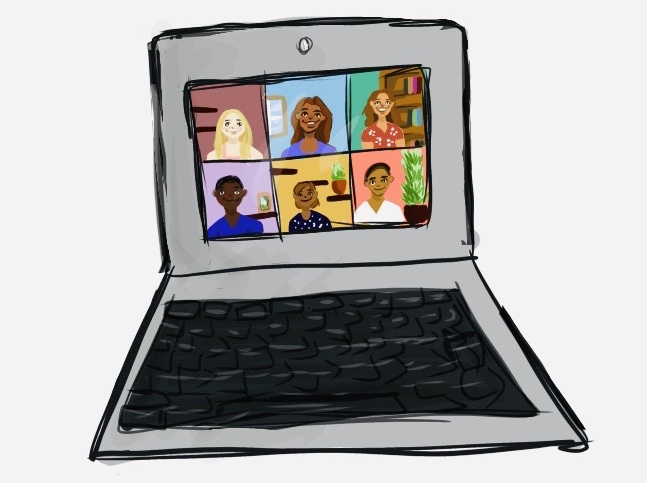
During COVID-19 people around the world joined together on online meeting sites. But many people with intellectual disabilities were left behind.
Did you know that many Respecting Rights self-advocates are not online?

Some don’t have the support they need to attend online meetings. Others don’t have internet access, computers, or smartphones. And others can’t afford to pay for internet service.
This means that many people with intellectual disabilities do not have online social supports.

Without social connections like friends and family, many people are feeling very lonely, sad, isolated, and worried about their mental health.
Respecting Rights has a message for families, agencies, and developmental services providers: During COVID-19, let’s do better at helping people with intellectual disabilities get online to connect safely with friends and family and participate in virtual activities.
3 reasons why it’s important to support people to get online:
1. MENTAL HEALTH: Self-advocates tell us they feel connected and happy when they see their friends’ faces on a video call. Feeling connected to friends and family is part of mental health.
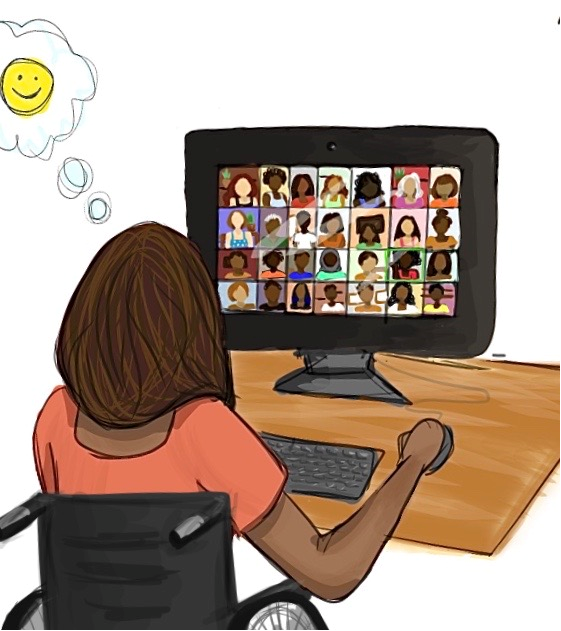
2. COMMUNITY PARTICIPATION in online activities: During COVID-19 the world shifted to online activities like yoga, bingo, cooking, music, and exercise programs. Self-advocates want to stay active and participate in online activities.
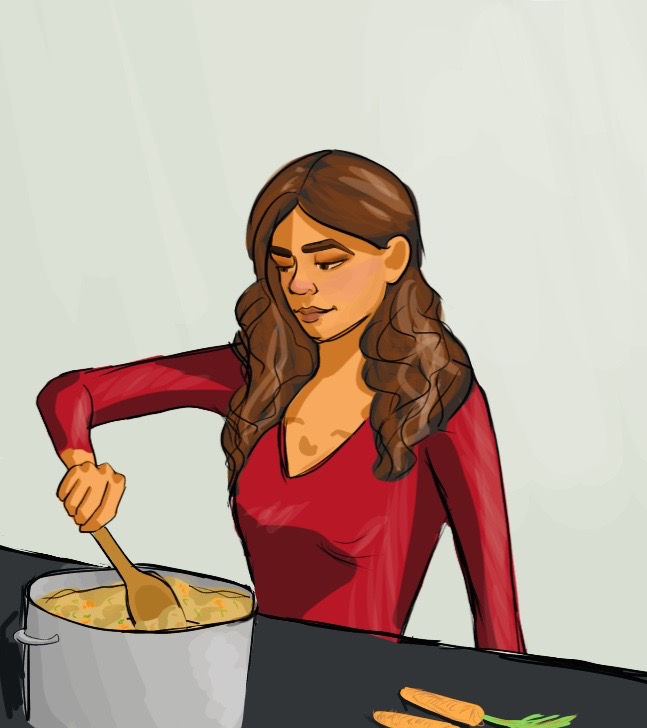
3. INSTANT ACCESS to family, partners & friends: Connecting with friends and family through online meetings can help people feel less lonely and isolated.
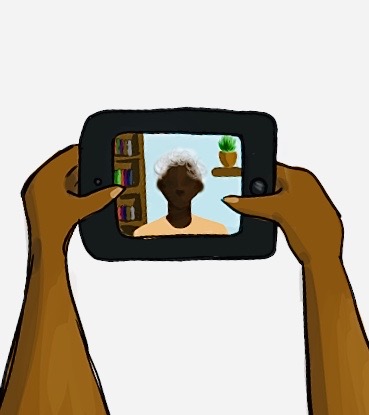
How can you help?
- ADVOCATE to make sure that people have internet service and access to devices that can connect to the internet.
- SUPPORT people to learn how to use the device as best as they can.
It might take some practice. Remember, everyone has the right to learn. - RESPECT privacy while on video calls. Do your best to help people
have calls in a private place where they can talk comfortably with their friends or family.

If you know someone with a disability who is not being supported to get online, let them know that they can call ARCH for free, confidential legal advice. ARCH’s contact information can be found at www.archdisabilitylaw.ca/contact
© ARCH Disability Law Centre, 2020
Images by Giuliana Barrow Lattanzio
Respecting Rights supports Institutionalization Survivors
March 19, 2019.
Respecting Rights participated in Flying to Freedom to commemorate 10 years since the closure of the last large government-run institutions for people labeled with an intellectual disability, and reflect on how we can commit to creating a fully inclusive society. The event was organized by institutional survivors and several organizations within the disability community, including People First of Ontario.
Respecting Rights spoke to The Journey from Institutionalization, and how they are addressing institutionalization and supporting people who have an intellectual disability to lead meaningful lives in the community.
Respecting Rights: My Voice My Choice Newsletter #1
October 10, 2019.
Go To Newsletter: https://mailchi.mp/68bc67d8f873/respecting-rights-my-voice-my-choice-newsletter-1?e=[UNIQID]
Pamphlets – My Voice, My Choice Workshops
These pamphlets introduce participants to My Voice, My Choice workshops and talk about the legal right to make decisions about your health and your money.
